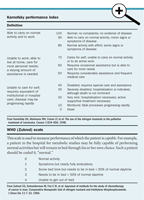Response Evaluation Criteria and Performance Scales
In clinical studies, formal response criteria have been developed and have gained wide acceptance. The National Cancer Institute (NCI) has proposed and implemented newer standard response criteria called Response Evaluation Criteria in Solid Tumors (RECIST). In contrast, the World Health Organization (WHO) has a different standard for assessing response. Major differences between these guidelines are outlined below.
Recist: Definition of Response
In clinical studies, formal response criteria have been developed and have gained wide acceptance.
The National Cancer Institute (NCI) has proposed and implemented newer standard response criteria called Response Evaluation Criteria in Solid Tumors (RECIST).
In contrast, the World Health Organization (WHO) has a different standard for assessing response.
Major differences between these guidelines are outlined below.

Comparison of RECIST and WHO guidelines
Performance Scales
The Karnofsky performance index and WHO (Zubrod) scale are commonly used as proxy measures for quality of life.
Because they measure only one dimension of the construct, they would not be considered quality-of-life measures by today’s standards.
However, given their historic relevance and current high frequency of usage as proxy measures, we have included them here.

Karnofsky performance index and WHO (Zubrod) scale